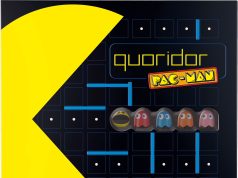 The newest import to hit our table from publisher 25th Century Games is Splito. It’s a quick playing filler game that will have you playing cards to a shared area with your neighbors. Think Sushi Go meets Between Two Cities. Does it have staying power despite its simplicity? Let’s find out.
The newest import to hit our table from publisher 25th Century Games is Splito. It’s a quick playing filler game that will have you playing cards to a shared area with your neighbors. Think Sushi Go meets Between Two Cities. Does it have staying power despite its simplicity? Let’s find out.
Splito is a card game for 2-8 players that takes about 15 minutes to play. Splito plays well at all player counts but is best at the higher end of that range.
Gameplay Overview:
To start the game, each player is dealt a hand of 13 cards. These will be a mixture of Number Cards or Objective cards. Each round, you must play 1 card to the tableau on either your left or right (that you share with your neighbor). After selecting and revealing your chosen card (everyone does this simultaneously), you pass your hand to the left and repeat the process. At the end of the 13 rounds, the objectives are all checked to see if they were fulfilled. A player’s score is multiplied by the scoring area on their left and their right. The highest score wins.

Game Experience:
Yes, the game is just that simple. Select a card, play a card, and hopefully don’t screw up. Splito works because of both its simplicity and its tactical decision-making. Unlike some other games in this genre, you don’t play cards to both piles each turn, but must select where you want to play. This can lead to some interesting table talk (“How about you play a card here every now and then?”) as you don’t want one of your score piles to fall too far behind.

Yet in the same vein, you are also not allowed to talk about your hand, so you can’t tell the other player that you are going to take care of that last 6 that needs to be played to the area. This can result in excess cards being played on a turn, or even both players neglecting a score card thinking the other will take care of it. Overall, it leads to some interesting and humorous moments.
Choosing whether to play a number card or an objective card is also one of the more interesting parts of the game. You won’t score points without an objective card, yet if you don’t actively play numbers to the tableau, you won’t have what you need to score the card. It’s an interesting dilemma that forces players to make the best decisions they have with the limited information on hand.

However, one of the things about Splito is that the game gets less interesting as it progresses. At the start, when you have 13 cards to play, you must put some thought into what card you are playing where. But by the time you get down to having only 2-3 cards in your hand, many of the board areas are largely decided. And unless you are playing with 7-8 players, chances are you’ve seen all the hands a few times, so you know what’s left. This can lead to moments where you just dump a card where it does the least amount of damage versus helping one of your scoring areas.
Finally, I want to talk about a minor frustration. The cards are not double-numbered like a standard deck of playing cards. So, when you get your initial hand of cards, you must flip over all upside cards to see all your numbers. It was a bit tedious to do this at the start of every game, especially because there is absolutely zero reason for the cards to not be double numbers—the cards literally just have a number and a pattern on them.
Final Thoughts:
Splito is a solid little filler game that I’ve been able to get to the table with both my gaming group and my family as well. The rules are super simple to pick up, and the game is over in about 15 minutes. While it’s not perfect, especially the end game, it’s definitely enjoyable for a handful of plays here and there.
Final Score: 3.5 Stars – A fun little filler game that’s pretty easy to get to the table.
 Hits:
Hits:
• Easy to learn, quick to play
• Interesting decisions of what cards to play and where
• Can be played with just about anyone
Misses:
• Cards not double numbered?!
• End game is a little on rails.





















